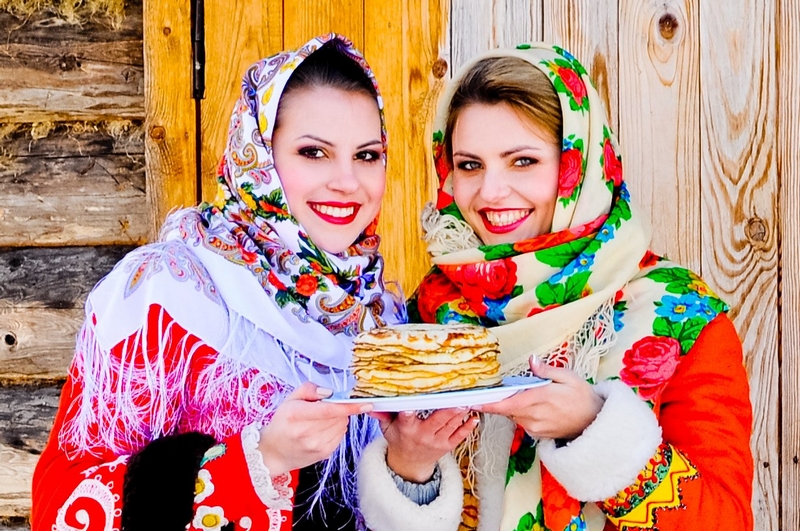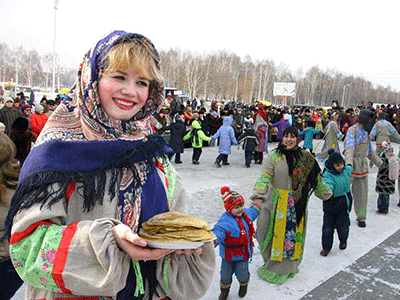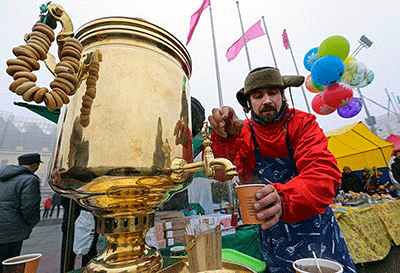At least, not if you happen to be in Russia during the midst of celebrating Maslenitsa. The holiday is observed in other Slavic Orthodox European countries, but nowhere more elaborately than in Russia.
“Maslenitsa” — a holiday vaguely similar to Pancake Day in the UK — is an ancient Slavic holiday that dates back to pagan times, having somehow survived the onset of Christianity. The Church incorporated the spring holiday into its cycle of religious observances, placing it on the Shrove Tuesday before the start of Lent. This year, the week of Maslenitsa begins on Feb 19.
Some people say the name Maslenitsa (variously translated as “Butter Week,” “Cheese Week,” or “Pancake Week” in English) comes from the fact that, according to Russian Orthodox tradition, meat is already off-limits by Shrovetide week, but dairy is not.
Maslenitsa is the richest and merriest of Russia’s festivities. It runs for a whole week. Rural folk used to call the holiday “sugar lips,” “kissy week,” “merrymaking,” and even “pig-out week.” One essential part of the merrymaking was horseback riding — and, of course, the horses donned their finest festive trimmings.
Young bachelors who hoped to wed would get hold of special sleighs, and every young couple took part in the tradition. Downhill sledding was also very popular amongst children, as were jumping hand-in-hand over bonfires and besieging ice forts.
In the 18th and 19th centuries, the central event of the Maslenitsa festivities would have been Mummers Plays, with villagers playing symbolic characters such as “Maslenitsa,” “The Voivode” (“The Warlord”), and so on. Usually, the storyline was that of the holiday itself — people gorging themselves ahead of Lent, along with farewells and promises to come back next year. This kind of play would sometimes include actual local events, as well.
Throughout the years, Maslenitsa always clung to its roots as a folk festival: all of its events are in some way related to the idea of driving away the winter and re-awakening nature from its slumber. Maslenitsa was celebrated with magnificent singing on the snowy hills. The symbol of Maslenitsa was always a scarecrow, decked out in women’s clothes and paraded around before being burned on the bonfire — along with the pancake in its hand.

Pancakes are the principle dish and symbol of the festival. They are made every day during the week, starting Monday, but most of all from Thursday to Sunday. Pancake-making is a pagan tradition that goes way back in Russian history. It is the pagan sun god “Yarilo” who banishes the winter darkness, and the round golden pancake is meant to represent the sun.
Housewives jealously guarded their own special pancake recipes and handed them down to their daughters, from one generation to the next. People would make them from wheat flour, buckwheat, oats or cornmeal, sometimes adding wheat or millet porridge, mashed potato, pumpkin, apples or cream as fillings.
An old custom in Russia declares that the first pancake of the batch symbolizes peace; usually the first pancake was be given to a beggar in remembrance of the dead, or simply put out on the window ledge. People ate their pancakes with sour cream, eggs, caviar and other tasty dressings, gobbling them down from noon until night, in between other tasty delights.
Maslenitsa has many jokes, sayings and songs associated with it. For example: “To the snowy hills go off, taking pancakes there to scoff!” “When is life at its best? Why, at sweetest Butter Week fest!” “It's the time to fill your tummy, with everything to eat that's yummy!” “Don't begrudge your hard-earned cash, spend it all and have a bash!” There were also warnings of the fasting ahead: “When the Butter Week has passed, we must endure the Great Lent Fast.” “Eat your fill, take all you need! For next week, it’s boiled swede.”
The festive week was often called “the pure, the broad, the quaint,” as well as “Madam Maslenitsa” or “Lady Maslenitsa.” Even now, each day of the holiday has its own special name, hinting at the customary festivity for that day.
Sunday — the final day of Maslenitsa — is the day for forgiving. On this day, people would ask forgiveness from their nearest and dearest for any sleights or grievances that might have happened over the year. Then, of course, there was singing and dancing. There would be a village bonfire, on which the scarecrow was be burned in a ritual to see off the winter. The bonfire would be in the village square, and the scarecrow would be carried off with jokes, songs and dances.


